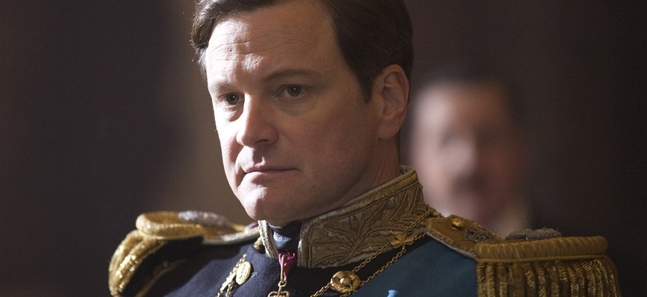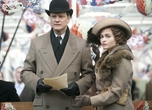Colin Firth: A right royal knockout
It's Oscar time for one of Britain's best loved actors

Posted: Fri Jan 28 2011
In the past two decades, Colin Firth has progressed from eye-candy for Jane Austen aficionados to one of the UK’s most committed and thoughtful screen actors. Following an Oscar nomination and Bafta win for last year’s A Single Man, Firth faced his toughest acting challenge to date as lifelong stutterer and unwilling monarch George VI in The King’s Speech from Tom Hooper, director of The Damned United. Firth’s performance has already taken several international critics’ prizes, putting him in the frontline of this year’s big awards.
Were you a student of the 1930s and ’40s before you agreed to The King’s Speech
I’d never read a royal biography until I did this film. It was not of interest at all. But it’s this idea of the 'B' plot of history which I like. Where history’s 'A' plot is Edward and Wallis Simpson, instead we go into the margins and make George the protagonist. A man who was not ready, who always struck me as having considerable humility and a reluctance to step into the limelight. The idea of telling a story about that man’s friendship with the person who helped him really interested me.
Do you find George VI to be a sympathetic figure?
I think so. He didn’t expect to be King of England; he was judged to be the dull, uncharismatic younger brother of a very charming, dashing heir to the throne. He was unprepared, and he had this terrible stammer. It was just an incredibly unfortunate card to draw. He had no constitutional power, his job was to speak and that was his biggest obstacle. Having to speak through a live microphone not just to Britain but to the entire Empire was an appalling prospect. And on top of that there was a war looming, and his adversaries in that war, Hitler and Mussolini, were probably the best in the business when it came to rhetoric. So it was quite a mountain to climb. It was a case of do it whether you like it or not, whether you’re vulnerable or not. You watch footage of him and it breaks your heart. I think he’d rather have faced almost anything else. He’d been dying to see action in World War I, but was refused because of his health problems. There was certainly no lack of courage in him.
Were you wary about the prospect of speech training?
I didn’t really have speech training. I went through my own process. There’s a lot of debate on how to cope with a stammer, but there’s not a lot on how to achieve one! The best source for me was David Seidler, our writer, who had a stammer as a boy. He told me that it was like being underwater, a drowning sensation. When you’re in that silence, it’s a big black hole and you don’t feel there’s an end to it. I watched footage of George VI and I could see that going on. Moments that were fairly brief to the rest of us must have felt like an eternity to him. But there was far more effort put in to getting our accents right. It seems odd that somebody like me would need a dialect coach to play a posh Brit, but I think we’ve forgotten how we used to sound. I was listening to some old news reports and they have that clipped, tapped 'R' sound that my grandfathers had. It wasn’t until Guy Pearce turned up that I realised how far we had to go, because he really nailed it. Not being a Brit, he had taken it on as a dialect study. We all thought: We don’t need to go that far because we’re basically already there. Which wasn’t true.
How was the atmosphere on set? It was cold, snowing and fairly austere when I visited.
There were jovial moments but I think it was quite tough. The hours were long, the weeks were long, it was a very unwieldy project to get done in the time we had. But fortunately there were enough personalities around to subvert that. Helena Bonham Carter is very funny, there’s always a sense of the unexpected with her, and Geoffrey Rush too. I think the humour works because our own relationships spilled into it. We had a lot of laughs. But I still can never get away from this feeling of a freezing cold set.
The scenes with you and Geoffrey Rush feel like pure performance. Did you have room to improvise?
We did have room to manoeuvre. Tom created an environment where suggestions were welcome. There was also the discovery of Lionel Logue’s [Rush’s character’s] diaries, which was like an archaeological discovery. That could have been a huge game changer. But to David Seidler’s credit, we found that the relationship in the diary corresponded very well to what he’d thought up, not least the wit and the banter and the bonhomie between the two men.
One of the surprising things about The King’s Speech is how funny it is. Was that in the script?
We were astounded by the reaction. We’d had a read through and there were some laughs, mostly from Helena, who’s very satisfying in that department. She’s got this wonderful cackle. I thought: Well, if she’s our audience then we possibly have a comedy. And then at the Telluride festival they were rolling in the aisles, but they cried as well. What more could you ask? Geoffrey and I walked out thinking: Okay, we’re at 9,000 feet, maybe it’s an altitude thing. We have to test it at sea level and see if they react the same way. It wasn’t inadvertent, I’m glad to say. It was important as a sign of my character’s strength. In order for him to not seem intolerably earnest or self-pitying, we had to see a sharp wit. But I didn’t think there would be any belly laughs. If anything, I thought we were in danger of making a rather staid and grim film about a man damaged by his upbringing.
Do you think this film continues a great British tradition of posh people swearing inappropriately?
Well, swearing had been part of David Seidler’s speech therapy. I don’t think he had any thought of the clumsy comic impropriety of the posh Brit letting out the B and the F- words. But that may be why people find it so funny and so acceptable. Think of the reaction to Jim Naughtie’s gaffe on the radio. Naughtie doesn’t sound like Hugh Grant or me, he’s a Scotsman, there isn’t that idea of, oh, whoops, a prig slipped up!
Following your awards success last year, have there been changes in what you’re being offered?
It’s hard to audit it. There was more coming my way this year, but it wasn’t necessarily better. Getting 50 scripts instead of five doesn’t mean you get 50 good ones. But I do think there is a little more variation in what people are prepared to take a risk on.
Read our review of The King's Speech here
Tweets
- About Us |
- Work for Time Out |
- Send us info |
- Advertising |
- Mobile edition |
- Terms & Conditions |
- Privacy policy |
- Contact Us
Copyright © 2014 Time Out Tokyo











Add your comment